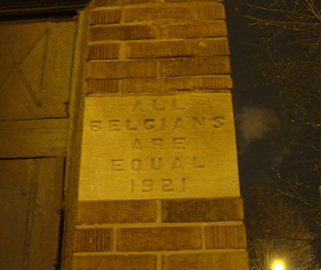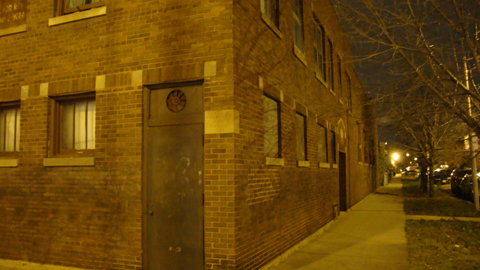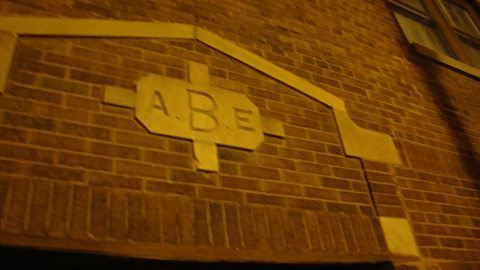This post is not about zombies, but instead about a weird discovery I made in my neighborhood.
The other day I was buying a bicycle pump at Wastyn Cycles near my house, when I espied an unusual cornerstone on a building at the corner of Fullerton Ave. and Talman Ave. It was engraved to read: “ALL BELGIANS ARE EQUAL 1921”
And I thought: “Okaaaaaaaay…”
But then I did a little research, and according to the Chicago History Museum, my neighborhood was an epicenter of Belgian immigration to Chicago in the early 1900’s. Then as now, there was French-speaking-Belgian vs. Flemish-Speaking-Belgian tension. So to smooth things over, a group of them founded something called the All Belgians Are Equal Club, which, in 1921, erected the building at Fullerton and Talman as a kind of clubhouse for the Belgian community.
Here are some pictures I took:



I wonder if the project worked, and if the Chicago-area Belgians learned to coexist peacefully.
When I was younger, I lived in Belgium for 3 years, in a French-speaking area. I’d hear about the intra-Belgian tension, and think to myself, man, these guys should really bond together instead of fighting. It’s not like there’s that much Belgium to go around. Why do you need to divide it up and make it even smaller?
I get the same feeling when my poet-friends criticize other contemporary poets. It’s like, dude, you guys are already only half-a-shelf in the bookstore as it stands. I think you need to work together to help poety get a wider audience instead of fighting over that half-a-shelf.
I love this building + its cryptic message. I was just doing a quick interweb search on “All Belgians Are Equal” and stumbled across your blog.
Scott,
Accidentally I stumbled across your post. It is a thought-provoking one. I grew up attending St. John Berchmann’s Church in Logan Square and participating in a slew of different Belgian (really, Flemish) functions at the Belgian Hall (as we called the building). The reality is that the Flemings – while the majority by numbers (59% in the most recent census vs 32% for the Walloons and 75% in 2005) and paying a majority (85%) of the taxes – do not a one-man, one-vote democracy. Moreover, it is only in the last decades that they have been allowed to be educated in their mother tongue (Dutch) and begun to push back the forced Frenchification that was foisted on them (schools, offices, street signs, etc.). One can hardly blame the Flemish for wanting at least a fair deal.
Thanks for your comment, David. I hope it’s clear that I do not presume to take sides in the intra-Belgian debate. 🙂
Paying more in taxes doesn’t make you more Belgian..but being cheap is a Flemish stereotype however 😉 Brussels residents, who are about 80% French speaking, also pay more taxes to cover the welfare gap (about $1800 yearly per Brussels family). The welfare gap is decreasing, and is expected to keep decreasing as the Flemish population is aging more rapidly, with increasing retirement costs. The welfare gap could be reversed altogether in coming decades. In the US, Republican states take in a lot more welfare than liberal ones (despite their anti-welfare rhetoric), but that doesn’t make them less American. There are language and historical issues in Belgium, but focusing on taxes really doesn’t put Belgians in the best light.
Joseph, I think you have missed the whole point about this post. And my guess is that you did not grow up in our Belgian colony here in Chicago. What people in Brussels pay for taxes is not part of the dialogue here. If you are interested in understanding the dynamic around the Belgian Hall, attend the Belgian Picnic on August 25th and I am happy to fill you in at that time.